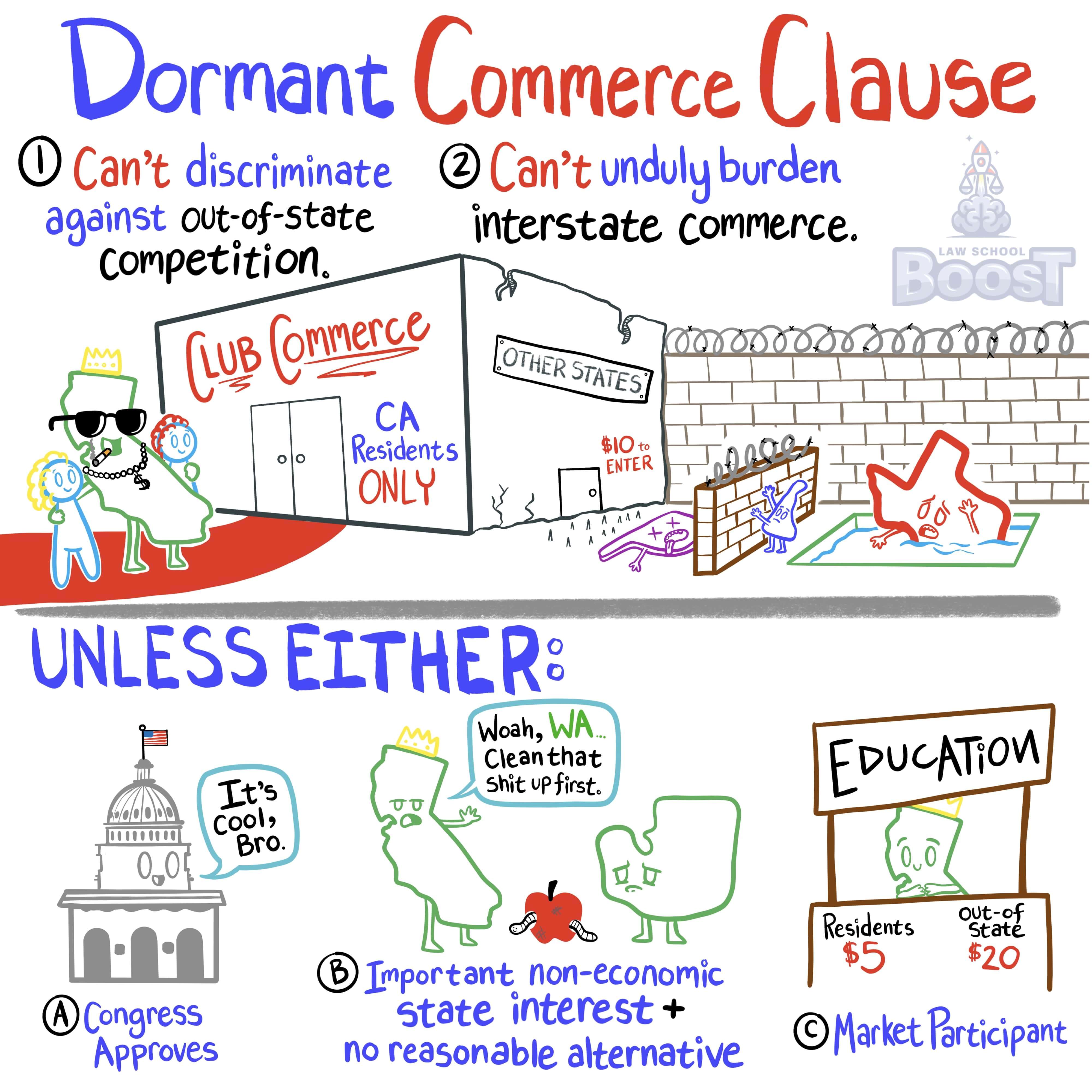🇺🇸
Constitutional Law • Dormant Commerce Clause
CONLAW#048
Legal Definition
There are 3 exceptions to the Dormant Commerce Clause: (1) Congress approves; *(2)* the law furthers an important non-economic state interest and there are no reasonably nondiscriminatory alternatives; or (3) the state or local body is a market participant, in which case it can charge higher fees to out-of-staters but cannot institute an outright ban. Congress can consent to state regulation of commerce even if it constitutes an undue burden.
Plain English Explanation
The Constitution gives Congress the power to regulate commerce between states. This implicitly means states can't pass laws that burden interstate commerce, unless Congress specifically allows it. This is called the "Dormant Commerce Clause."
But there are exceptions where states can affect interstate commerce. First, Congress can explicitly approve a state law, even if it burdens commerce. Second, states can pass laws for important reasons, like public safety, if there are no other reasonable options. For example, a state can require trucks to meet certain safety standards. Finally, when states act as market participants, like selling goods or services, they can favor in-state residents but can't completely ban out-of-staters. For instance, a state university can charge higher tuition to non-residents but can't prohibit them from attending.
The rationale is to balance state sovereignty with an integrated national economy. States can legislate for valid reasons, but not economic protectionism. The exceptions allow flexibility when needed or appropriate.
But there are exceptions where states can affect interstate commerce. First, Congress can explicitly approve a state law, even if it burdens commerce. Second, states can pass laws for important reasons, like public safety, if there are no other reasonable options. For example, a state can require trucks to meet certain safety standards. Finally, when states act as market participants, like selling goods or services, they can favor in-state residents but can't completely ban out-of-staters. For instance, a state university can charge higher tuition to non-residents but can't prohibit them from attending.
The rationale is to balance state sovereignty with an integrated national economy. States can legislate for valid reasons, but not economic protectionism. The exceptions allow flexibility when needed or appropriate.
Hypothetical
Hypo 1: Hypofornia passes a law that only Hypofornia-grown apples can be sold in its schools. New Hypoland, known for its delicious apples, finds its apples banned from Hypofornia schools. Result: This law will be struck down because it discriminates against interstate commerce without fitting into any of the exceptions.
Hypo 2: Hypofornia operates a chain of state-owned stores and decides to sell wine from Hypofornia vineyards at a lower price than wines from New Hypoland. Sam, a wine producer from New Hypoland, sues. Result: Hypofornia's pricing policy is allowed because the state is acting as a market participant, not a regulator.
Hypo 3: New Hypoland passes a law that bans the sale of all fruit from Hypofornia due to a recent fruit fly infestation. Congress has not approved this regulation. Result: This law is potentially upheld if it can be shown to further an important non-economic state interest (protecting agriculture from pests) and there are no reasonably nondiscriminatory alternatives.
Hypo 4: Hypofornia operates several airports and decides to charge higher landing fees to non-Hypofornia based airlines than to those based in Hypofornia, arguing that it needs the extra revenue to maintain and improve airport facilities. Bob, the CEO of New Hypoland Airlines, sues Hypofornia, claiming the fees are discriminatory. Result: The court upholds Hypofornia's higher fees for New Hypoland Airlines, citing that Hypofornia is acting as a proprietor managing its own property. Since the state is not regulating commerce but rather managing its resources, the fees are considered a legitimate action.
Hypo 2: Hypofornia operates a chain of state-owned stores and decides to sell wine from Hypofornia vineyards at a lower price than wines from New Hypoland. Sam, a wine producer from New Hypoland, sues. Result: Hypofornia's pricing policy is allowed because the state is acting as a market participant, not a regulator.
Hypo 3: New Hypoland passes a law that bans the sale of all fruit from Hypofornia due to a recent fruit fly infestation. Congress has not approved this regulation. Result: This law is potentially upheld if it can be shown to further an important non-economic state interest (protecting agriculture from pests) and there are no reasonably nondiscriminatory alternatives.
Hypo 4: Hypofornia operates several airports and decides to charge higher landing fees to non-Hypofornia based airlines than to those based in Hypofornia, arguing that it needs the extra revenue to maintain and improve airport facilities. Bob, the CEO of New Hypoland Airlines, sues Hypofornia, claiming the fees are discriminatory. Result: The court upholds Hypofornia's higher fees for New Hypoland Airlines, citing that Hypofornia is acting as a proprietor managing its own property. Since the state is not regulating commerce but rather managing its resources, the fees are considered a legitimate action.
Visual Aids



